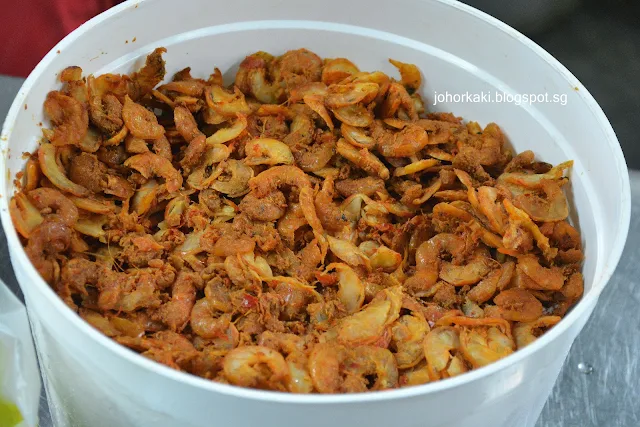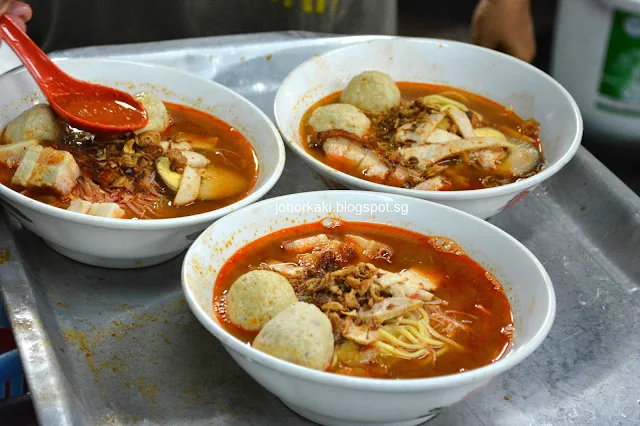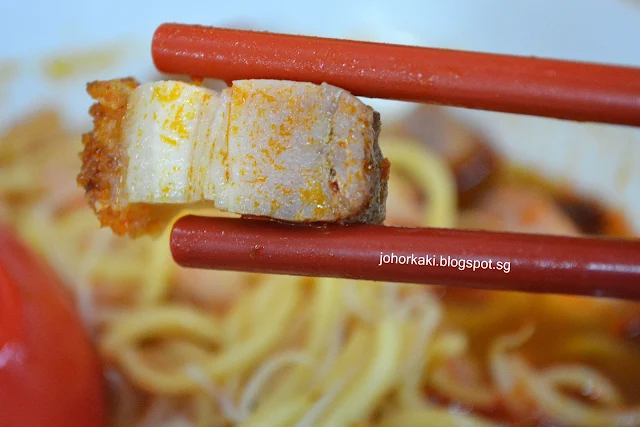Penang is famous for many good food like Penang char kway teow, Penang asam laksa, Penang curry mee, Penang nasi kandar but many Penangites told me that it's Hokkien mee they turn to for comfort food. You can find Penang Hokkien mee everywhere in Penang at anytime.
Modern day Hokkien mee is a gentrified version of a dish with very humble roots. (Penang Hokkien mee is known as prawn mee in Johor and Singapore.)

I am told by locals that Hokkien mee was created out of bad times. The dish appeared during the Japanese Occupation of Malaya from 1942 to 1945.
During those dark years, too poor to buy the usual ingredients for their food, locals turn to whatever was available at hand.
The local fishermen made stock using discarded prawn heads and shells because the Japanese took all the prawn meat. The dish uses only tiny wild caught sua lor prawns as the bigger meatier prawns always landed on Japanese tables. There were small, thin slices of pork as the fishermen exchanged fish for pork with their equally impoverished pig farmer compatriots. The fishermen threw in a few stems and leaves of crunchy kang kong in the dish as these weeds were abundant in long kangs (drains and canals). The broth and ingredients were eaten with yellow wheat noodles or rice noodles. Fresh chili sauce was used to spice up the dish. Chili was abundant because it was not part of Japanese diet.
Modern day Hokkien mee is a gentrified version of a dish with very humble roots. (Penang Hokkien mee is known as prawn mee in Johor and Singapore.)

I am told by locals that Hokkien mee was created out of bad times. The dish appeared during the Japanese Occupation of Malaya from 1942 to 1945.
During those dark years, too poor to buy the usual ingredients for their food, locals turn to whatever was available at hand.
The local fishermen made stock using discarded prawn heads and shells because the Japanese took all the prawn meat. The dish uses only tiny wild caught sua lor prawns as the bigger meatier prawns always landed on Japanese tables. There were small, thin slices of pork as the fishermen exchanged fish for pork with their equally impoverished pig farmer compatriots. The fishermen threw in a few stems and leaves of crunchy kang kong in the dish as these weeds were abundant in long kangs (drains and canals). The broth and ingredients were eaten with yellow wheat noodles or rice noodles. Fresh chili sauce was used to spice up the dish. Chili was abundant because it was not part of Japanese diet.
Made out of mostly discards, an iconic, wonderfully tasty dish was created out of desperation.
However, authentic aka 1940s Hokkien mee is hard to find even in Penang today.
However, authentic aka 1940s Hokkien mee is hard to find even in Penang today.
This urban legend, of course, is not evidence based though it makes for fun reading 🤭
In Xiamen, China today, there is a dish known as Xiamen Prawn Noodle 厦门虾面 which closely resembles Hokkien mee of Penang. This is likely the predecessor of Penang Hokkien mee.

Irene brought me to this very popular Lebuh Presgrave 888 Hokkien Mee 三條路 888 福建面 near her own old office.

三條路 888 福建面 stall is near the iconic Komtar tower and along the same road as Kwong Wah Yit Poh newspaper.

Step behind the humble push cart stall, and there are plenty of seats.
The Hokkien mee here at 三條路 was indeed superb, though it is far removed from its humble predecessor. 三條路 serves lots of extras, luxuries which appeal to today's customers.

The tiny sua lor were there. Lots of it.

The pork slices were there. In good, generous sized slices.

We can add sio bak or roast belly pork to this Hokkien mee.

How about braised pork trotter or intestines? Pork ribs?

Here you can even get ping pong size fish balls to go with your Hokkien mee.

Our bowl of Penang Hokkien mee. We indulged in a little added on sio bak.

The soul of Hokkien mee is in it's prawny broth. At 三條路 888, the sweet and savoury broth rocks.

Second to the prawny broth, to me, the chili sauce is what sets Penang Hokkien mee apart from the versions in Johor and Singapore. The full bodied chili sauce has a sharp sting and is the ingredient that balances the savoury crustacean flavour in the broth.

The sio bak was nice, but it was just nice to have. Personally, just the ordinary little prawns and skinny pork slices do fine :D

The boss was extremely busy, so we did not get to speak with her. Just a smile, quick hello and thank you, as we were leaving.
Acknowledgement: Original Century Food Pte Ltd, maker of MyOri Penang White Curry Noodles supported my visit to Penang and my mission to "Put Every Good Hawker on the World Wide Web".

Restaurant name: Lebuh Presgrave 888 Hokkien Mee 三條路888福建面
Address: Off Lebuh McNair, corner lot 67-A Lebuh Presgrave, Georgetown, Penang
GPS: 5.411001,100.330694
Hours: 4:30pm to 12:00 midnight (Closed on Thurs)
Non Halal
Date visited: 26 Oct 2014
Return to Johor Kaki homepage.

This post is making me miss Penang.
ReplyDeletethis place aint about hokien mee, its all about the lor mee, best in penang.
ReplyDeleteoh... I wanna to back and try that too
DeleteThis comment has been removed by a blog administrator.
ReplyDeleteThis comment has been removed by a blog administrator.
ReplyDelete